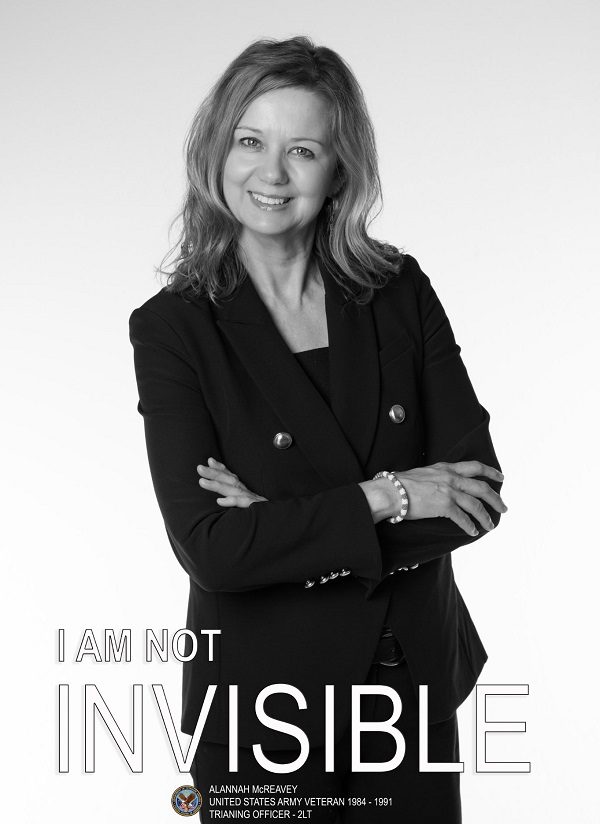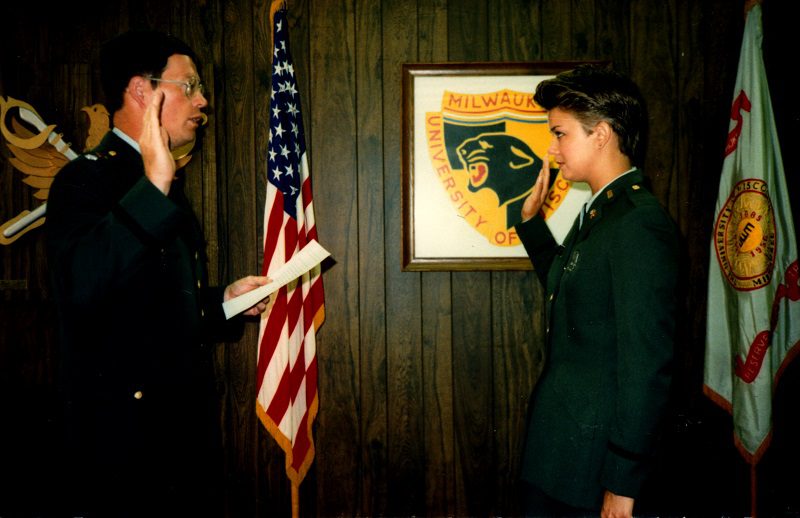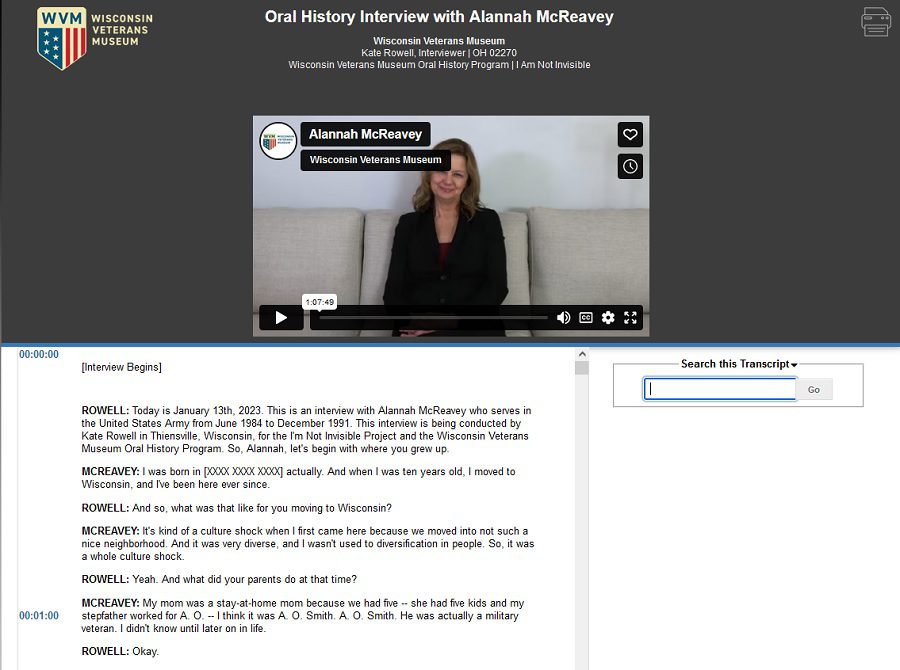
The Wisconsin Veterans Museum supports Women's History Month. As part of that effort, we are featuring Alannah McReavey, who agreed to interview with us for the statewide women veterans oral history project: I Am Not Invisible. Here is her story.
Alannah McReavey served with the United States Army Reserves from June 1984 to December 1991. While in the military, she served with the 84th Training Command, then the 84th Division (Training). She served initially on the enlisted side and later as an officer, eventually commanding a company in the 84th Division.
McReavey enlisted in the United States Army Reserves to make additional income and to be able to pay for college courses. Below is a video clip where she talks about some of her less-than-fun experiences as a recruit at Army Basic Training at Fort Jackson, South Carolina. After basic, she worked full-time as an administrative assistant in the civilian world, with the reserve drill pay as additional income. Her experience as an administrative assistant in the civilian world meant that she received credit for that Military Occupational Specialty (MOS) and that she did not have to attend Advanced Individual Training (AIT) for administration (71L).
A friend encouraged McReavey, and as a result, they joined the Reserve Officers Training Corps (ROTC) together at the University of Wisconsin-Milwaukee (UWM). In 1987, following graduation from UWM, McReavey was commissioned a second lieutenant. Below is a picture of McReavey taking the oath of office at UWM.

McReavey takes the oath of office, University of Wisconsin-Milwaukee ROTC, 1987.
Then-Second Lieutenant McReavey returned to the 84th Division (Training) and took the training officer position, responsible for planning training for the unit for physical fitness, marksmanship, weapons assembly, nuclear-biological-chemical (NBC), and other topics. In the video below, she explains that she had very supportive non-commissioned officers who mentored and teamed with her as the training officer to ensure she enforced Army standards. She received an Army Achievement Medal for her efforts in unit readiness.
McReavey explains the difficulties of being a company commander and what that role can be like when you are in charge of people with more experience and sometimes more rank than you. She also reveals what it was like at that time as a female leader and company commander in a unit composed mainly of senior male leadership.
After being honorably discharged from the military, McReavey continued in her civilian career. Today, one of the things that McReavey enjoys is supporting veterans. She explains her philosophy on veteran support, “I think the military community, they don't really want handouts or anything like that. And I think some people think that they do, but they really don't. They just want to help other veterans. They continue their service. I meet so many veterans that want to give back because they know how it feels when--especially combat vets.” During the interview, McReavey discusses the challenges veterans face when transitioning from the military to the civilian world; see the video below.
In this same vein, McReavey leverages her business experience and connections for veterans while serving as the president of the Wisconsin Veterans Chamber of Commerce board. They are currently working on a Wisconsin job board for veterans who have just left the service. She also supports the Milwaukee Homeless Veterans Initiative and is involved in the women's veterans program at the Woman’s Club of Wisconsin; see the videos below. To watch the complete McReavey interview, click here or on the interview page at the bottom of this post.
Below are clips from McReavey’s oral history interview with the Wisconsin Veterans Museum Oral History Program on January 13, 2023.
McReavey on Army Basic Training:
MCREAVEY: They had red ants apparently and when I was laying down, a lot of us got bites all over us. So, that was just the normal, the chafing, the heat, you know, the normal beat-up thing. I think my feet were okay most of the time. A lot of the girls had serious problems with it. But we did this, I guess, called a confidence course, which had multiple ones of it. And this particular one, we had to go up-- I think it's about forty feet up in the air. There's these little blocks and there this rope and you have to go across the water. So, you go up and you're supposed to grab onto this rope, look up and ask permission to drop into the water. But I have kind of smaller hands and the rope was meant for men because there were several of us that injured ourselves. So, instead of me asking permission to drop, I went up to the rope and I kind of fell. Well, I did fall. I fell the wrong way and hit my head on the water. So, I remember saying involuntary words and a stretcher came out. And honestly, I don't remember if they brought me to the doctor. I don't remember anything. I just-- once I hit the water, I just remember because I was kind of out of it that someone was, you know, getting me out of the water or whatever. So, I think I had a headache for a couple of days, but then I was fine.
McReavey on mentorship and teamwork:
MCREAVEY: Well, I was really fortunate I was on a team of other sergeants who were very supportive of me, actually, and some had served active duty. They kind of took me under their wing and there was a full-time sergeant who handled the administration for our S-1 unit. And he was also very instrumental in helping me. I was working hard, but they were very supportive, and we did a great job and then we ended up getting a, um, this Kevin, I can't think of his last name. He was the administrator that I'm referring to, and he did all the paperwork. And then our unit, I think I got an Army achievement medal for our unit readiness because of our NBC [nuclear, biological, chemical] training, medical, M-16 in our unit. So, that was kind of a big deal. So, I actually had a pretty positive experience, although they say officers worked once a month, it's not true. You're always working. And then there was one captain and maybe one or two guys, uh, they were a little hard on me, but it was mostly make sure your hair is under your hat. Again, take this seriously kind of thing. Um, you know, now that I look back, I can see why they expected that of me. I mean, I was an officer, a very attractive young female officer. So, they're just saying, "Hey," you know, "You're in the military, you need to be serious about this." So. But overall, everyone was very kind, and I learned a lot, so.
McReavey on being an officer:
MCREAVEY: Well, it was really scary because literally there was no training. It's like, here, you're an officer, you're going to do this major, big project. And I was quite nervous. But for some reason I was managed-- I managed to push through it and just even though I didn't know something, I just pushed through it or tried to find someone that could help me. And luckily in the military it's all about teams. So, you know, I'd have people help me and sometimes I just make mistakes and it just was the way it is. I never remember being reprimanded by making mistakes because, um, yeah. For some reason, I just don't remember it. Yeah, it's a little crazy because everything is big. Everything's big. There's thousands of people and Fort Sill is a training-- basic training location. So, when we're there, we go into the mess hall and as an officer, everyone stands up. I mean, it's just overwhelming when you're a really young officer. But I'm really grateful for all it because I think it's benefited me my whole entire life.
McReavey on being a company commander:
INTERVIEWER: And can you talk about, um, transitioning into the role of company commander? Uh, what that was like for you?
MCREAVEY: So, it was mostly the training officer, and I don't remember. I think the company commander was maybe the last year I was in the service. Yeah, we did a lot of, you know, I have to go in front of everybody and do-- Gosh, I can't even think what it is. You know, the etiquette when you're standing up and directing people. Again, I felt like I was quite nervous, like thinking, oh, my gosh, you got some high ranking, you know, [inaudible] people, officers in particular don't have a lot of respect for their NCOs and their sergeants. And so, it was really interesting to get in front of them and kind of lead them, even though they were outranking in experience and everything. But overall, I think everyone knew, hey, she's young and she's trying and we're going to help her. So, I think overall, it went pretty good. Kevin was on there the whole time through the reserves, so he worked full time and I worked part time. So, it was actually a lot of work outside of the-- the reserve unit. You know, I put training things together and we had to make sure that everybody followed the SOP [standard operating procedure] and it was-- the unit I was in was mostly training. So, me being the training officer, going to company commander actually was a good transition because I was familiar with it. Um, so I think yeah, the company commander, it really wasn't too much different except for, you know, you feel a little scared because you're leading people with more experience than you.
McReavey on the military-to-civilian transition:
MCREAVEY: And then the more I gotten involved, I got to meet everybody and realized that, you know, combat vets and active-duty people when they come back and transition to civilian life, it's the toughest time for them. So, be able to support them and then help them. The Chambers promotes veterans to start new businesses, and actually, the veteran community is more prone to start a business than civilian. And I never knew that.
McReavey on the Wisconsin Veterans Chamber of Commerce:
MCREAVEY: Now I've been with the Wisconsin Veterans Chamber of Commerce for about six years, and I started as their events committee chair and then a board member, and now I'm the president of the board for the last two years, which is awesome. And I meet so many different people and I've done so many things and I can't tell you how much of a blessing it's been for me. Then I'm also the chair-- or co-chair and will be the main chair for Operation Grateful Giving, and that-- we start in August, and we get gifts and things for a 360 Christmas bags that go to the VA hospital on Christmas Eve and the domiciliary and rehabs for veterans. So, it's a big deal. And I love-- absolutely love doing it, but I just do whatever I can do.
McReavey on the Milwaukee Homeless Veterans Initiative and the Woman’s Club of Wisconsin:
MCREAVEY: And then this past Christmas, I did something with the Milwaukee Homeless Veterans Initiative for at work. And we had so much stuff. I filled my trunk and my car up and we-- apparently the Milwaukee Homeless Veteran initiative, if there's a veteran, they have family, they can go and buy Christmas gifts and then wrap them there for the gifts. And then we also did all the, you know, the towels, irons, all that other stuff, too. So that was pretty gratifying. And then the other thing, I think it was about four years now, we put in a women veteran program. So, it's at the Milwaukee Woman's Club, which is the oldest women's club in the US. And it's kind of cool because it's all women. Pictures, it's like a country club. It's all women. And the bathroom is like, elaborate, and the men's bathroom is on the lower level. They have to go downstairs to, you know, not so nice place. So, we have really good women leaders that speak there. And Debbie, who is director of the Milwaukee Homeless Veterans Initiative, she-- she was one of the speakers. So, I'm really proud of the women's event. We put together with a raffle and then we do a fundraiser, and I think the last time went to the Milwaukee Homeless Veterans Initiative, too. So, I like to do more things with women veterans because I think they just don't acknowledge themself. And so, it's just a good area for me to work on.


